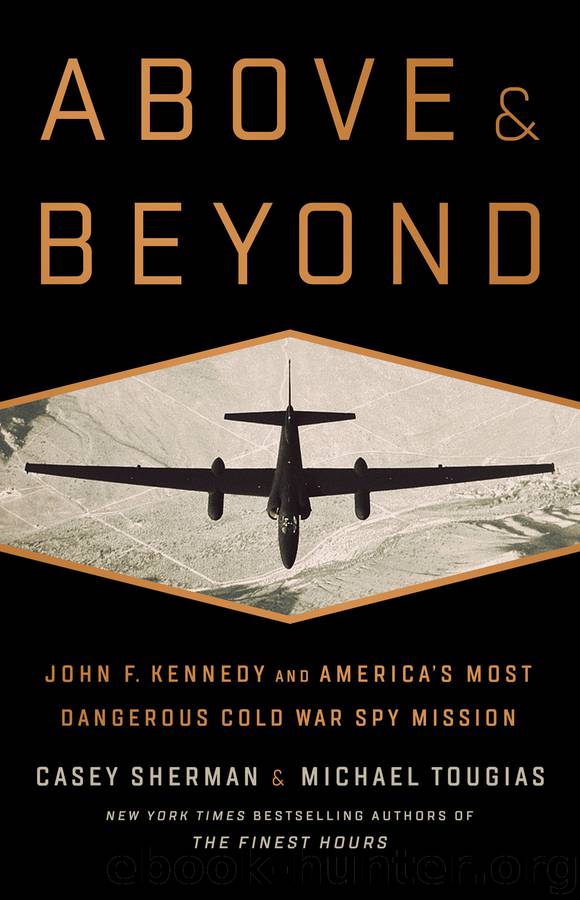Above and Beyond by Casey Sherman & Michael J. Tougias

Author:Casey Sherman & Michael J. Tougias
Language: eng
Format: epub
Publisher: PublicAffairs
Published: 2018-05-01T04:00:00+00:00
DURING THIS PERIOD when the Joint Chiefs were advocating a massive military attack, both President Kennedy and his brother Bobby were evolving from their initial reaction—to just take the missiles out—toward a more measured approach. Bobby endorsed the idea of first trying the blockade.
For Bobby, a good part of that change of preference had to do with the consequences of a sneak air attack on the missile bases and other installations. He equated such a step with Japan’s surprise attack on Pearl Harbor. When he first learned about the missiles and he and the president were leaning toward an air strike during the initial ExComm meeting, Bobby had passed a note to his brother. It read, “I now know how Tojo felt when planning Pearl Harbor.”2 In his fixation on the attack at Pearl Harbor, he progressed from feeling like he was about to wage it to arguing that a surprise attack was un-American. He later told the ExComm members that “for 175 years we had not been that kind of country. A sneak attack was not in our traditions. Thousands of Cubans would be killed without warning and a lot of Russians too.”3
While Pearl Harbor influenced Bobby, his brother found inspiration in a book he had just read, Barbara Tuchman’s The Guns of August, chronicling how World War I started. This Pulitzer Prize–winning work illuminated how nations can tumble into war not so much by strategy as by reaction to events. The president drew the parallel that if he launched surprise air strikes, the Soviets would have no option but to respond, and soon the dominoes would start falling on the way to all-out nuclear war, which neither side wanted. The two brothers even talked about the book, with the president emphasizing how simple miscalculations led to consequences few had foreseen. Bobby later recalled that his brother pointed out how “stupidity, individual idiosyncrasies, misunderstandings, and personal complexes of inferiority and grandeur”4 all had led to escalating responses and counterresponses. In his book Thirteen Days, Bobby explained that the president did not want to “challenge the other side needlessly, or precipitously push our adversaries into a course of action that was not intended or anticipated.”
At about noon on Friday, October 19, the president kept to his campaign schedule and flew to the Midwest, while his advisors continued to work on hammering out the specific actions and time frames of the different political and military options. For Kennedy, the charade of campaigning must have been a lonely endeavor. He sensed that before the weekend was finished he’d have to distill the many pieces of advice and his options down to a cohesive plan. Just one man, the president, had to make a decision that could mean life or death for millions of people across the globe.
Download
This site does not store any files on its server. We only index and link to content provided by other sites. Please contact the content providers to delete copyright contents if any and email us, we'll remove relevant links or contents immediately.
| Anthropology | Archaeology |
| Philosophy | Politics & Government |
| Social Sciences | Sociology |
| Women's Studies |
The Secret History by Donna Tartt(19046)
The Social Justice Warrior Handbook by Lisa De Pasquale(12186)
Thirteen Reasons Why by Jay Asher(8892)
This Is How You Lose Her by Junot Diaz(6875)
Weapons of Math Destruction by Cathy O'Neil(6264)
Zero to One by Peter Thiel(5786)
Beartown by Fredrik Backman(5737)
The Myth of the Strong Leader by Archie Brown(5496)
The Fire Next Time by James Baldwin(5429)
How Democracies Die by Steven Levitsky & Daniel Ziblatt(5213)
Promise Me, Dad by Joe Biden(5141)
Stone's Rules by Roger Stone(5080)
A Higher Loyalty: Truth, Lies, and Leadership by James Comey(4950)
100 Deadly Skills by Clint Emerson(4919)
Rise and Kill First by Ronen Bergman(4778)
Secrecy World by Jake Bernstein(4740)
The David Icke Guide to the Global Conspiracy (and how to end it) by David Icke(4699)
The Farm by Tom Rob Smith(4502)
The Doomsday Machine by Daniel Ellsberg(4484)
